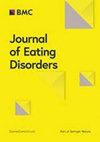Ethics-testing an eating disorder recovery memoir: a pre-publication experiment
IF 3.5
3区 医学
Q2 NUTRITION & DIETETICS
引用次数: 0
Abstract
Narratives (including memoirs and novels) about eating disorders (EDs) are typically published with the intention to benefit readers, but survey evidence suggests that reading such narratives with an active ED may more often be harmful than helpful. To reduce the probability of inadvertent harm and learn more about how narrative reading and EDs interact, a pre-publication study was designed to determine whether or not a recovery memoir should be published. 64 participants with a self-reported ED read either the experimental text (The Hungry Anorexic [HA]) or a control text (Ten Zen Questions [TZ]) over a roughly two-week period. All participants completed the Eating Disorder Examination Questionnaire (EDE-Q) and the Anorexia Nervosa Stages of Change Questionnaire (ANSOCQ) one week before and two weeks after reading, and answered three recurring open-ended questions at regular timepoints during and after the reading. Computational analysis of the free-text responses assessed text/response similarity and response characteristics on emotional, sensory, and action-effector dimensions. Both rating-scale and free-text data were analysed using mixed ANOVAs to test for effects of time and condition, and the university ethics board was notified in advance of the quantitative threshold for harmful effects that would prohibit the ED memoir from being published. On the two quantitative measures, there was an effect of time but not of condition: Significant improvement was found in both groups on the EDE-Q (with a medium-to-large effect size) and the ANSOCQ (with a very large effect size). In an ANCOVA analysis, no significant mediating effects were found for age, education, duration of professional support for the ED, or pre/post-reading BMI change. For the free-text responses, linguistic similarity measures indicated that HA responses most closely matched the text of HA, with the same being true for TZ. In a word-norm analysis, text condition significantly affected six emotional, sensory, and action-effector variables (interoception, olfaction, gustatory, mouth, torso, and hand/arm), mean scores for all of which were higher in HA responses than TZ responses. Close reading of readers’ responses explored two potential mechanisms for the positive effects of time but not condition: engagement with the during-reading prompts as part of the experimental setup and engagement with the texts’ dialogical form. The ED memoir was found not to yield measurably harmful effects for readers with an ED, and will therefore be published. The finding that significant improvement on both quantitative measures was observed irrespective of text condition suggests that positive effects may be attributable to linguistic characteristics shared by the two texts or to elements of the reading and/or reflective processes scaffolded by both. The quantitative results and the free-text testimony have implications for our understanding of bibliotherapy, “triggering”, and the practicalities of responsible publishing. This paper reports on an experiment designed to decide whether a memoir about recovery from an eating disorder (ED) should be published. Previous research suggested that reading books about EDs may have strongly negative effects, especially for individuals with an ED. In this experiment, 64 participants were randomly assigned to read either the memoir under investigation, The Hungry Anorexic (HA), or a book unrelated to EDs, Ten Zen Questions (TZ). Participants completed two questionnaires before and after reading the book over roughly two weeks: the Eating Disorder Examination Questionnaire (EDE-Q), a common measure of eating disorder severity, and the Anorexia Nervosa Stages of Change Questionnaire (ANSOCQ), used to assess attitudes to illness and recovery. Participants also answered three recurring open-ended questions at timepoints during and after their reading. The book would not be published if EDE-Q scores of participants in the HA group worsened significantly, and worsened more than those of participants in the TZ group. Scores on both measures improved significantly between pre- and post-reading for both groups, so the memoir will be published. The positive effects may be due to a feature shared by the two books or a feature of the reading process independent of the books themselves.对饮食失调康复回忆录进行伦理测试:出版前实验
有关饮食失调(ED)的叙事作品(包括回忆录和小说)的出版目的通常是为了让读者受益,但调查证据表明,在患有活动性 ED 的情况下阅读此类叙事作品可能往往弊大于利。为了减少无意中造成伤害的可能性,并更多地了解叙事性阅读与 ED 之间是如何相互作用的,我们设计了一项出版前研究,以确定是否应该出版康复回忆录。64 名自称患有饮食失调症的参与者在大约两周的时间里阅读了实验文本(《饥饿的厌食者》[HA])或对照文本(《十个禅问》[TZ])。所有参与者都在阅读前一周和阅读后两周填写了饮食失调检查问卷(EDE-Q)和神经性厌食症变化阶段问卷(ANSOCQ),并在阅读过程中和阅读后的固定时间点回答了三个重复出现的开放式问题。对自由文本回答的计算分析评估了文本/回答的相似性以及情感、感官和行动效果方面的回答特征。评分量表和自由文本数据均采用混合方差分析来检验时间和条件的影响,并提前通知大学伦理委员会有害影响的定量阈值,禁止发表 ED 回忆录。在两个定量指标上,时间有影响,但条件没有影响:在 EDE-Q(中-大效应大小)和 ANSOCQ(非常大效应大小)上,两组均有显著改善。在方差分析中,没有发现年龄、教育程度、ED 专业支持持续时间或阅读前后 BMI 变化有明显的中介效应。对于自由文本回答,语言相似性测量结果表明,HA 回答与 HA 文本的匹配度最高,TZ 也是如此。在单词规范分析中,文本条件对六个情绪、感官和动作效应变量(互感、嗅觉、味觉、口腔、躯干和手/臂)有显著影响,所有这些变量的平均得分在 HA 的回答中都高于 TZ 的回答。通过仔细阅读读者的回答,我们探究了时间而非条件产生积极影响的两个潜在机制:参与作为实验设置一部分的阅读过程中的提示,以及参与文本的对话形式。研究发现,ED 回忆录不会对有 ED 的读者产生明显的有害影响,因此将予以发表。无论文本条件如何,两种定量测量结果都有明显改善,这一发现表明,积极效果可能归因于两种文本所共有的语言特点,或两种文本所支持的阅读和/或反思过程的要素。定量结果和自由文本证词对我们理解书目疗法、"触发 "和负责任出版的实用性都有影响。本文报告了一项实验,该实验旨在决定是否出版一本关于饮食失调(ED)康复的回忆录。以前的研究表明,阅读有关 ED 的书籍可能会产生强烈的负面影响,尤其是对 ED 患者而言。在这项实验中,64 名参与者被随机分配阅读所调查的回忆录《饥饿的厌食者》(HA)或一本与 ED 无关的书《十个禅问》(TZ)。在大约两周的时间里,参与者在阅读该书前后分别填写了两份问卷:饮食失调检查问卷(EDE-Q)和神经性厌食症变化阶段问卷(ANSOCQ),前者是衡量饮食失调严重程度的常用指标,后者用于评估对疾病和康复的态度。参与者还在阅读过程中和阅读后的时间点回答了三个重复出现的开放式问题。如果 HA 组参与者的 EDE-Q 分数显著恶化,且恶化程度高于 TZ 组参与者,则该书将不会出版。在阅读前和阅读后,两组参与者在这两项指标上的得分都有明显提高,因此这本回忆录将得以出版。产生积极效果的原因可能是两本书的共同特点,也可能是阅读过程中独立于书籍本身的特点。
本文章由计算机程序翻译,如有差异,请以英文原文为准。
求助全文
约1分钟内获得全文
求助全文
来源期刊

Journal of Eating Disorders
Neuroscience-Behavioral Neuroscience
CiteScore
5.30
自引率
17.10%
发文量
161
审稿时长
16 weeks
期刊介绍:
Journal of Eating Disorders is the first open access, peer-reviewed journal publishing leading research in the science and clinical practice of eating disorders. It disseminates research that provides answers to the important issues and key challenges in the field of eating disorders and to facilitate translation of evidence into practice.
The journal publishes research on all aspects of eating disorders namely their epidemiology, nature, determinants, neurobiology, prevention, treatment and outcomes. The scope includes, but is not limited to anorexia nervosa, bulimia nervosa, binge eating disorder and other eating disorders. Related areas such as important co-morbidities, obesity, body image, appetite, food and eating are also included. Articles about research methodology and assessment are welcomed where they advance the field of eating disorders.
 求助内容:
求助内容: 应助结果提醒方式:
应助结果提醒方式:


